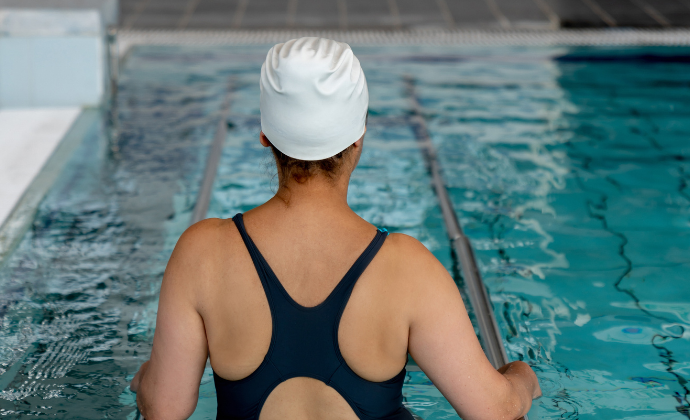People living with Parkinson’s who exercise regularly reduce the impact and progression of the disease better than those who do not.
Exercising in heated water has some unique properties that enable both therapy and fitness – especially for people who can’t exercise comfortably on land.
Poor balance, gait and gravity cause fear and injury for many people with Parkinson’s. Exercising in water removes the risk of falls and therefore the fear. Water also offers buoyancy which allows for practice of bigger movements to progressively improve the large range of motion.
Simultaneously the turbulence of the water acts to challenge balance and coordination, leading to improved walking and overall stability for daily tasks.
The water’s multi-directional resistance helps the individual to maintain or enhance muscular strength and endurance even with gentle movements – enabling better focus on movement.
The heat of the water helps sooth and relax the muscles, lessening tremors, reducing rigidity and pain, and giving a feeling of freedom that’s not available on land. People living with Parkinson’s can stand tall in water with increased back extension, improving their posture.
Hydrostatic pressure is another benefit of exercising in water. Hydrostatic pressure is the force exerted by the water on the body. Hydrostatic pressure can:
- Reduce swelling
- Reduce pain
- Help the heart and boost circulation
- Reduce sensory input to the brain
- Reduce the pooling of blood in the extremities
These are a lot of benefits for just getting into a pool.
Water makes low impact exercise is possible, whilst doing the same exercise on land may stress joints and muscles. Many people who have difficulty moving on land find movement easier and can continue longer in the water – thereby improving the effectiveness of the exercise and improving their quality of life.
The reluctance to exercise on land will cause muscles to weaken and joints to stiffen, leading to even smaller weaker ranges of movement. People living with Parkinson’s who don’t attempt to exercise find themselves moving less, losing confidence – and eventually their independence.
Those who exercise in water generally have a successful exercise experience, giving feelings of productivity, enjoyment, and the desire to continue exercise.
So, to sum up the benefits of water exercise:
- No fear of falling.
- Posture support and improvement.
- Ability to perform exercise that you couldn’t do on land.
- Improving the effectiveness of exercise.
- Bigger stronger freedom of movements.
- Water resistance building strength.
- Water turbulence challenges and improves balance, gait, and coordination.
- Warm water reduces tremors, stiffness, and pain.
- Reduces swelling.
- Help the heart and boosts circulation.
- Reduces the pooling of blood in the extremities.
- Reduces sensory input to the brain, calming it.
- Improved bowel function.
- Potentially gives social interaction and enjoyment, decreasing feelings of isolation and depression and encouraging an overall sense of well-being.
Patients who have tried warm water exercise report:
- A wider range of movement
- Better stability
- Greater independence
- Increased confidence
- Better quality of life
However, be mindful of some considerations prior to commencing water exercise.
- Obtain a medical release form from your doctor
- Speak to your primary caregiver before starting a new exercise program.
- Wear aquatic footwear to protect the feet from scrapes or cuts.
- Never swim alone.
As the goal of exercise is to improve symptoms, slow the progression of Parkinson’s, improve overall function, and enhance quality of life to maintain independence, it makes warm water exercise a great choice.
References:
https://pubmed.ncbi.nlm.nih.gov/30904467/
https://www.goodshepherdrehab.org/press-releases/aquatic-therapy-benefits-people-with-parkinsons-disease/
https://waterresist.com.au/pages/parkinsons-and-aquatic-therapy
https://www.hydroworx.com/blog/aquatic-exercise-benefits-people-with-parkinsons-disease/
https://www.apdaparkinson.org/uploads/files/Aquatic-Book_8-08—edited-2015-oUM.pdf






